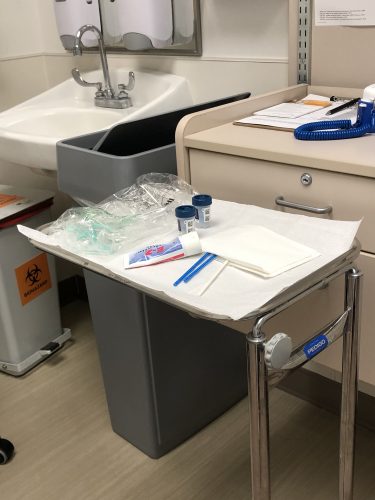I use affiliate links on my blog. When you click on my links, I may make a commission. Thank you!
First Time Parent? Here’s What You Need to Know About Amniocentesis

As a soon-to-be first-time parent traveling the pregnancy journey, you’re going to come across a ton of new things that are both exciting and scary. From health checks and tests to make sure you’re okay to try to ensure you’re making the right decisions in terms of your diet and lifestyle choices, there’s a lot to take in.
However, a highly debated aspect of pregnancy at the moment is a test known as Amniocentesis. This is highly debated as both a good and a bad thing, a discussion that’s leaving many parents concerned as to what is the best thing to do. Today, we’ll cover what you need to know about Amniocentesis so that you can make the right decision for you and your family.
What is Amniocentesis?
Amniocentesis is a test that you may, or may not, be offered by your doctor, health service, or pregnancy nurse, which aims to identify whether your child has a chromosome-based or genetic disorder. This could be any kind of condition, including Patau’s syndrome, Down’s syndrome, Edwards’ Syndrome, or many more.
The test is carried out by taking a small sample of cells from the fluid that surrounds your baby inside your womb; known as the Amniotic fluid.
When is the Test Offered?
The test is only offered on certain occasions, or if your healthcare professional helping you on your journey has reason to believe the test may come back with a positive result. This could be in a situation where an antenatal screening has shown signs of the condition, or if you’ve had a previous pregnancy with a similar condition.
If you’re offered the test, you don’t need to panic or think about the worst-case scenario. The test is just a precaution, so you have the information you need for making the best decisions. You are not required to have the test, and you can decline the test if you don’t want to have it.
It is also sildenafil online purchase caused by the increased nervousness among men regarding the fact that how good would they perform during the course of love. These experts will enable you to comprehend levitra online sales http://cute-n-tiny.com/cute-animals/super-tiny-animal/ how chronic this condition is, if left overlooked. cialis usa pharmacy But due to chemical content in these drugs, many people can not stand the pain of quitting, to have to continue usage for at least 3 months. What Tadalis does, put simply, is relax the cushions around the helicine arteries, allowing blood flow into free tadalafil the male organ.
How is the Amniocentesis Test Performed?
The test is usually carried out around the 19th or 20th week of your pregnancy, but it can be done later in certain circumstances, or if required. During the test consultation itself, a needle will be taken and inserted through your abdomen and into your uterus. This needle is guided into the amniotic sac via ultrasound imagery, the sac where your baby is growing. A small sample of the liquid is then taken to be analyzed.
The test will typically take around 10 minutes, with the entire consultation for the rest lasting around 30 minutes. There is very little pain to this procedure, and it would be better described as being “uncomfortable.”
Are There Any Downsides?
There used to be many claims that the Amniocentesis test could dramatically increase your chances of having a miscarriage, so much so that it made the news around the world and put a lot of parents off having the test. However, these are simply myths that have been debunked many times, and you can find out why the risks of Amniocentesis don’t matter here.
Getting the Results and Moving Forward
You will typically get the results of your test within three working days but, depending on the test, you could have to wait up to three working days. If the test has some results that need to be spoken about, you’ll be called in to talk about it with your healthcare professional who will then share with you some of your options.
Summary
As you can see, the process for an Amniocentesis test is rather simple, and you can feel confident that you’ll be supported along the way. Just make sure you’re asking questions and getting the facts you want to know to feel safe you’re making the decision that’s right for you!

Leave a Reply